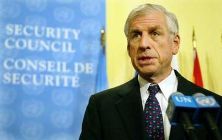U.S. says UN not being tough enough on Sudan
By Evelyn Leopold and Nima Elbagir
UNITED NATIONS, Sept 2 (Reuters) – The United States accused Sudan on Thursday of using attack helicopters against African villagers and said the United Nations was not being tough enough on Khartoum.
 U.S. Ambassador John Danforth spoke after Sudan’s foreign minister said in Khartoum that his government had largely complied with U.N. demands to restore security in Darfur.
U.S. Ambassador John Danforth spoke after Sudan’s foreign minister said in Khartoum that his government had largely complied with U.N. demands to restore security in Darfur.
Danforth also criticized U.N. officials for suggesting that fielding thousands of African Union observers would be conditional upon whether or not Sudan was able to protect its people in Darfur.
“The fact of the matter is that the Government of Sudan has been directly involved in attacks on villages,” Danforth said.
“If the job of providing security is provided exclusively by people who have been dropping bombs on the people of Darfur, the people of Darfur are going to say, ‘what kind of protection is this,'” Danforth said.
Earlier Jan Pronk, the U.N. envoy for Sudan, briefed the 15-member U.N. Security Council on his report, issued on Wednesday under Secretary-General Kofi Annan’s name. Pronk proposed a wider mandate for African Union monitors to help stop abuses in the western Darfur region.
Pronk listed 10 issues where Sudan had complied with its pledges. But he again cited Khartoum’s failure to stop marauding Arab militia, known as Janjaweed, from killing, raping and attacking African civilians in an 18-month terror campaign over arable farm land and other issues.
In Khartoum, Foreign Minister Mustafa Osman Ismail told reporters, “The obligations, which the government of Sudan was asked (to do), we already fulfilled, maybe by more than 70 to 80 percent.”
He said he expected Security Council members to “try to balance between what has been achieved by the Sudanese government, which is irrefutable, and the pressures being exerted by certain groups for he condemnation of the government.”
After years of low-level conflict between Arab nomads and African farms, African rebels launched a revolt last year, accusing the government of arming the Janjaweed to loot and burn their villages. Some 1 million people have been herded into camps out of their homes and lack food and medicine.
BIGGER MANDATE FOR AFRICAN UNION
The 53-member African Union now has some 80 monitors and 300 troops to protect them in Darfur. The United Nations has proposed about 3,000 AU military observers and troops and another 1,100 police to observe all abuses.
But their mandate is to observe a cease-fire between African rebels and the Sudanese army only.
Pronk told reporters many more than 3,000 monitors or troops were needed. He told the council their mandate should include protection of African villagers. They should be on the ground “24 hours a day,” mediate conflicts and “sleep in the camps” for uprooted civilians.
Sudan so far opposes expanding the mandate. But Pronk said this was not the end of the story and “I have the impression that the request will come.” He also said the African Union still had to present an official plan.
The main question, Pronk said, was whether Sudan is willing to stop the Janjaweed or really unable to do it in the vast western Darfur region. “If they cannot do it, then they have an obligation to ask for international assistance,” he said.
But he differed from Danforth on Sudan’s involvement in the conflict over the last month, saying that Khartoum was not attacking villagers any longer but had not stopped militias.
Danforth criticized Pronk for not mentioning an African Union report that cited air attacks against villages in Darfur on Aug. 26. Pronk, who had noted the attack against two villages in his written rather than his oral briefing, told reporters it was not certain yet whether the Sudanese government was attacking rebels in self-defense.
Danforth also said 25 percent of the refugees surveyed by by U.S. officials in Chad reported they had been “attacked exclusively” by the Sudanese military. Another 50 percent said the attacks came from the government working with the militia.
The Security Council threatened on July 30 to consider imposing unspecified sanctions on Sudan if it failed to disarm and prosecute the Janjaweed. But no action is expected soon, as the U.N. report made clear that ending the crisis in Darfur could not be accomplished within a month.
Danforth said sanctions were not going to turn into a “pumpkin” and go away. But so far only European nations like Britain, France and Germany, support them.
Some council members want an open debate on Darfur next week but others oppose it and the issue has not yet been decided.
